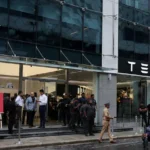ArdorComm Media Bureau
July 16, 2025
Tesla officially entered the Indian automobile market on Tuesday with the opening of its first showroom in the Bandra-Kurla Complex (BKC), an upscale business district in Mumbai. The launch marks the electric vehicle (EV) giant’s much-anticipated foray into the world’s third-largest car market, after years of negotiation and policy roadblocks.
The newly opened facility in Mumbai will serve as Tesla’s flagship retail and experience centre, introducing Indian consumers to its global EV portfolio. Initially, the company will import and sell the Model Y, with the rear-wheel-drive long-range variant priced at ₹6.78 million ($79,089). Deliveries are expected to begin in Q3 of 2025.
While Tesla vehicles retail for approximately $44,990 in the United States (excluding tax incentives), high import duties and a premium positioning are expected to limit Tesla’s reach in India’s price-sensitive auto market.
Despite this, industry observers say Tesla’s entry signifies increasing investor trust and adds momentum to India’s clean mobility goals. “Tesla brings cutting-edge EV technology to India. With deeper local engagement, the company can stimulate the EV ecosystem, support innovation, and align with national sustainability targets,” said Gaurav Vangaal, Associate Director at S&P Global Mobility.
Policy Shifts and Delayed Promises
Tesla’s arrival follows prolonged delays stemming from India’s steep import duties—previously as high as 100% for fully built imported EVs. In April 2016, Tesla CEO Elon Musk had invited Indian customers to place pre-orders, but no deliveries followed, and the advance payments were eventually refunded.
In 2019, Musk expressed concern that India’s tariffs made Tesla cars “unaffordable,” urging for policy reforms. The situation shifted significantly earlier this year after Prime Minister Narendra Modi’s visit to the U.S. in February 2025, prompting the Indian government to launch a revised EV policy. This policy reduced import taxes to 15% for EVs under $35,000, provided manufacturers commit to building local factories within three years.
Although Musk initially planned a visit to India in April—widely seen as a precursor to announcing manufacturing plans—the trip was cancelled due to pressing company matters, and Musk instead traveled to China, one of Tesla’s core markets. Since then, Tesla has clarified that it has no immediate plans for domestic production in India.
The U.S. government has also weighed in, with President Joe Biden expressing concern that Tesla could potentially use Indian manufacturing to circumvent U.S. tariffs, complicating ongoing bilateral trade negotiations between the two nations.
Tesla’s Competition and Market Landscape
In India, Tesla is expected to compete with high-end automakers such as BMW and Mercedes-Benz, rather than local budget players like Tata Motors or Mahindra & Mahindra. However, the luxury car segment accounts for just 1% of India’s total car sales, making it a niche but potentially influential market.
Currently, EVs form just over 2% of India’s overall car market, but the government aims to increase that share to 30% by 2030 through incentives and infrastructure development.
Starlink and Broader India Plans
Tesla’s India strategy goes beyond cars. Musk’s other venture, Starlink, which aims to provide satellite-based internet, has seen recent progress in India. The service still requires telecom spectrum allocation from the government—a process expected to take a few months—before commercial operations can begin.
In sum, while Tesla’s India debut is a symbolic and strategic milestone, the journey ahead depends on how quickly it can localize operations, navigate regulatory frameworks, and align with India’s evolving EV goals.
Source: AP
Photo Credit: Reuters


